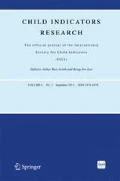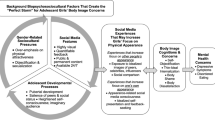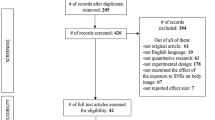Abstract
This study examined the association among body image, self-esteem, and body image and depression in a sample of 3658 Korean adolescents (male 53.4 %). The extant research on these relationships have been conducted primarily on samples from Western countries, where although thinness is similarly pursued findings have limited generalizability due to differences in societal context. Participants from South Korea completed assessment measures of body image, self-esteem, and depression. Hierarchical regression analyses were used across three BMI groups (underweight N = 1293, normal weight N = 1627, and overweight groups N = 486). Various group differences were found in the relationships. After controlling for covariates age, amounts of exercise and subjective perceptions of health, body image was found to have significant effects on both self-esteem and depression. Implications and future research directions based on the findings are discussed.
Similar content being viewed by others
References
Bissell, K. L., & Chung, J. Y. (2009). Americanized beauty? Predictors of perceived attractiveness from US and South Korean participants based on media exposure, ethnicity, and socio-cultural attitudes toward ideal beauty. Asian Journal of Communication, 19, 227–247. doi:10.1080/01292980902827144.
Borges, G., Benjet, C., Medina-Mora, M. E., & Miller, M. (2010). Body mass index and its relationship to mental disorders in the Mexican Adolescent Mental Health Survey. Salud Pública de México, 52, 103–110.
Cash, T. F. (1994). Multidimensional Body-Self Relations Questionnaire. Norfolk: Old Dominion University.
Cash, T. F. (2002). Cognitive-behavioral perspectives on body image. In T. F. Cash & T. Pruzinsky (Eds.), Body image: A handbook of theory, research, and clinical practice (pp. 38–46). New York: Guilford.
Dixon, J. B., Dixon, M. E., & O’Brien, P. E. (2002). Body image: appearance orientation and evaluation in the severely obese. Change with weight loss. Obesity Surgery, 12, 65–71.
Eidsdottir, S. T., Kristjansson, A. L., Sigfusdottir, I. D., Garber, C. E., & Allegrante, J. P. (2014). Association between higher BMI and depressive symptoms in Icelandic adolescents: the mediational function of body image. European Journal of Public Health, 24, 888–892.
Erickson, S. J., Robinson, T. N., Haydel, K. F., & Killen, J. D. (2000). Are overweight children unhappy? Body mass index, depressive symptoms, and overweight concerns in elementary school children. Archives of Pediatric and Adolescent Medicine, 154, 931–935.
E-Seoul Statistical (2014). 2014 Survey. South Korea; E-Seoul Statistical, No. 84. p2. Retrieved from http://stat.seoul.go.kr/jsp2/WWS8/WWSDS8123.jsp?link=2111&cd=005&srl=228.
Falkner, N. H., Neumark-Sztainer, D., & Story, M. (2001). Social, educational, and psychological correlates of weight status in adolescents. Obesity Research, 9, 32–42.
Frost, J., & McKelvie, S. (2004). Self-esteem and body dissatisfaction in male and female elementary school, high school, and university students. Sex Roles, 51, 45–54.
Furnham, A1., Badmin, N., & Sneade, I. (2002). Body image dissatisfaction: gender differences in eating attitudes, self-esteem, and reasons for exercise. Journal of Psychology, 136(6), 581–96.
Gatti, E., Ionio, C., Traficante, D., & Confalonieri, E. (2014). “I like my body; Therefore, I like myself”: how body image influences self-esteem--A cross-sectional study on Italian adolescents. Europe’s Journal of Psychology, 10, 301–317. doi:10.5964/ejop.v10i2.703.
Gim, W. S. (2007). Korean overall body esteem scale (KOBES): development, validation and gender differences. Korean Journal of Women Psychology, 12, 231–253.
Goldfield, G. S., Moore, C., Henderson, K., Buchholz, A., Obeid, N., & Flament, M. F. (2010). Body dissatisfaction, dietary restraint, depression, and weight status in adolescents. Journal of School Health, 80(4), 186–192.
Gray, L., & Leyland, A. H. (2008). Overweight status and psychological well-being in adolescent boys and girls: a multilevel analysis. European Journal of Public Health, 18, 616–21.
Haugen, T., Johansen, B. T., & Ommundsen, Y. (2014). The role of gender in the relationship between physical activity, appearance evaluation and psychological distress. Child and Adolescent Mental Health, 19, 24–30. doi:10.1111/j.1475-3588.2012.00671.x.
Hausenblas, H. A., & Fallon, E. A. (2006). Exercise and body image: a meta-analysis. Psychology and Health, 21, 33–47. doi:10.1080/14768320500105270.
Havighurst, R. (1972). Developmental Tasks and Education. New York: McKay.
James, K. (2000). “You can feel them looking at you”: the experiences of adolescent girls at swimming pools. Journal of Leisure Research, 32, 262–280.
Kim, J.-S., & Kim, Y. (2009). Body perception, dietary attitude and self-esteem in middle school boys and girls. Journal of Korean Home Economics Education Association, 21, 123–139.
Kim, Y. S., & Lee, M. S. (2012). The effect of the participation in leisure sport activity on self-esteem and depression in female university students: exploratory study of body image mediating path model. Journal of Korean Physical Education Association for Girls and Women, 26, 97–109.
Kim, J. H., & Lennon, S. J. (2007). Mass media and self-esteem, body image, and eating disorder tendencies. Clothing and Textiles Research Journal, 25, 3–23. doi:10.1177/0887302x06296873.
Kim, J.-E., & Min, H.-S. (2008). Weight-related perceptions, practices and eating behaviors of middle school students: associations with BMI. Korean Journal of Community Nutrition, 13, 13–23.
Kim, M. J., Lee, K. J., Yune, S. K., Kim, S. J., Chung, A. I., Hwang, J. U., Sung, Y. H., & Lyoo, I. K. (2004). The effect of other’s evaluation for subject’s appearance and appearance satisfaction on self-esteem in female undergraduates. Korean Journal of Psychopathology, 13, 32–36.
Korea Medical Care Agency (2015). How do you know if you are obese? Retrieved June 1, 2015, from http://www.kormedi.com/care/center/Default.aspx?category=041010&idx=188.
Koronczai, B., Kökönyei, G., Urbán, R., Kun, B., Pápay, O., Nagygyörgy, K., Griffiths, M. D., & Demetrovics, Z. (2013). The mediating effect of self-esteem, depression and anxiety between satisfaction with body appearance and problematic internet use. The American Journal of Drug and Alcohol Abuse, 39, 259–265. doi:10.3109/00952990.2013.803111.
Kriston, P., Pikó, B., & Kovács, E. (2012). Self perceived health, as an indicator of psychological well-being: behavioral epidemiological analysis among the adolescent population. Orvosi Hetilap, 153, 1875–1882. doi:10.1556/OH.2012.29491.
Latner, J. D., Knight, T., & Illingworth, K. (2011). Body image and self-esteem among Asian, Pacific Islander, and White college students in Hawaii and Australia. Eating Disorders, 19, 355–368. doi:10.1080/106400266.2011.584813.
Lee, M. (1997). Relationship of body image, acculturative stress, and self-esteem among Korean female college students (Unpublished master’s thesis). OH: Ohio State University.
Lee, Y. M. (2003). Female middle and high school students ‘bizarre plastic surgery’ popular. Munhwa Ilbo. Retrieved from http://www.munhwa.com/news/view.html?no=2003090501012725008006.
Lee, C. (2015). 9 in 10 bulimia patients are women: Report. The Korea Herald. Retrieved from http://www.koreaherald.com/view.php?ud=20150209001192.
Lim, H. J., Park, H. R., & Koo, H. K. (2009). National Survey on Child Obesity. Seoul: Korea Institute for Youth Development.
McCabe, M. P., & Ricciardelli, L. A. (2004). A longitudinal study of pubertal timing and extreme body change behaviors among adolescent boys and girls. Adolescence, 39, 145–166. doi:10.1007/s10964-006-9062-5.
Muthén, L. K., & Muthén, B. O. (2006). Mplus User’s Guide. Los Angeles: CA.
Needham, B. L., & Crosnoe, R. (2005). Overweight status and depressive symptoms during adolescence. Journal of Adolescent Health, 36, 48–55.
Neumark-Sztainer, D., Wall, M., Larson, N., Story, M., Fulkerson, J. A., Eisenberg, M. E., & Hannan, P. J. (2012). Secular trends in weight status and weight-related attitudes and behaviors in adolescents from 1999–2010. Preventive Medicine, 54, 77–81. doi:10.1016/j.ypmed.2011.10.003.
Oh, K. J., Ha, E. H., Lee, H. L., & Hong, K. E. (2001). K-YSR: Koran-Youth Self Report. Seoul: Chungang Jucksung Publisher.
Park, J. S., Lee, M. K., & Shin, H. C. (2007). The perceived body importance model of self-evaluation on restrained eating and bulimia behaviors in a sample of female undergraduate. Korean Journal of Clinical Psychology, 26, 73–91.
Park, H.-I., Kwon, S.-Y., & Jung, C.-H. (2010). The relationship among body weight, self-esteem, depression and anxiety in community adolescents. Journal or Korean Society of Biological Therapies in Psychiatry, 16, 23–32.
Petrie, T. A., Greenleaf, C., Reel, J., & Carter, J. (2009). Personality and psychological factors as predictors of disordered eating among female collegiate athletes. Eating Disorders, 17, 302–321. doi:10.1080/10640260902991160.
Republic of Korea Ministry of Culture, Sports & Tourism (2013). A National Survey on Physical Activity Participation in Korea. Seoul, Korea.
Ricciardelli, L. A., McCabe, M. P., Holt, K. E., & Finemore, J. (2003). A biopsychosocial model for understanding body image and body change strategies among children. Journal of Applied Developmental Psychology, 24, 475–495. doi:10.1016/s0193-3973(03)00070-4.
Rosenberg, M. (1965). Society and the Adolescent Self-Image. Princeton: Princeton University Press.
Siegel, J. M. (2002). Body image change and adolescent depressive symptoms. Journal of Adolescent Research, 17, 27–41.
Sington, M. M., & Birch, L. I. (2006). Individual and sociocultural influences on pre-adolescent girls’ appearance schemas and body dissatisfaction. Journal of Youth and Adolescence, 35, 165–175.
Slutzky, C. B., & Simpkins, S. D. (2009). The link between children’s sport participation and self-esteem: exploring the mediating role of sport self-concept. Psychology of Sport and Exercise, 10, 381–389. doi:10.1016/j.psychsport.2008.09.006.
The Herald Business (2014). 30.5% of college students feel the need to have plastic surgery in order to get a job. Retrieved from http://news.heraldcorp.com/view.php?ud=20140527000917&md=20140529004937_BK.
The Korea Herald (2013). “Korean women top plastic surgery ratio” Retrieved from http://www.koreaherald.com/view.php?ud=20130201000786.
Veldhuis, J., Konijn, E. A., & Seidell, J. C. (2014). Counteracting media’s thin-body ideal for adolescent girls: informing is more effective than warning. Media Psychology, 17, 154–184. doi:10.1080/15213269.2013.788327.
Wardle, J., & Cooke, L. (2005). The impact of obesity on psychological well-being. Best Practice & Research Clinical Endocrinology & Metabolism, 19(3), 421–440.
Acknowledgments
This work was supported by Hankuk University of Foreign Studies Research Fund.
Author information
Authors and Affiliations
Corresponding author
Rights and permissions
About this article
Cite this article
You, S., Shin, K. & Kim, A.Y. Body Image, Self-Esteem, and Depression in Korean Adolescents. Child Ind Res 10, 231–245 (2017). https://doi.org/10.1007/s12187-016-9385-z
Accepted:
Published:
Issue Date:
DOI: https://doi.org/10.1007/s12187-016-9385-z




